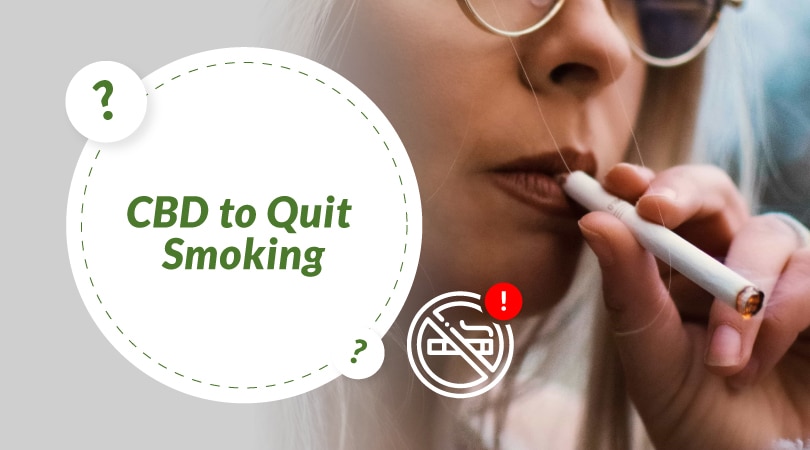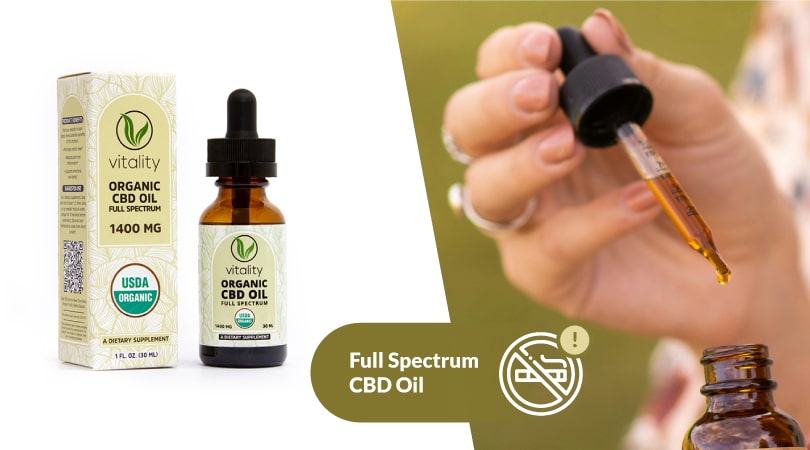
CBD to Quit Smoking: A Potential Ally to a Smoke-Free Life
Quitting smoking is one of the most important decisions you can make for your health, but nicotine’s highly addictive nature makes it a tough challenge.
While traditional smoking cessation methods like nicotine replacement therapy (NRT) and behavioral counseling can help, they don’t work for everyone.
If you are trying to quit smoking, we’ve got good news! Emerging research suggests cannabidiol (CBD) could be a helpful tool to quit smoking.
CBD is a cannabinoid that doesn’t cause a “high” because it doesn’t have any psychoactive properties.
It interacts with the body’s endocannabinoid system (ECS) and influences many physiological functions, including mood, stress, and cravings.
Research suggests that by targeting these areas, CBD may support smokers in overcoming their addiction more effectively than traditional methods alone.
Keep reading to get an in-depth look into nicotine addiction, withdrawal symptoms, how CBD to quit smoking works, the science behind it, and how to choose the best CBD product for your needs.
How to Know if You Are Addicted to Nicotine
Nicotine addiction is a physical and psychological dependence on nicotine, meaning that it will affect your mind and body.
The way it works is by altering your brain’s chemistry, stimulating the release of dopamine—a neurotransmitter responsible for feelings of pleasure. Over time, your brain needs more nicotine to release the same amount of dopamine, leading to tolerance and dependence.
Psychological dependence is just as challenging. Many smokers associate smoking with stress relief, socializing, or specific daily routines, reinforcing their habit.
Recognizing the signs of nicotine addiction is a crucial first step toward quitting.
Signs of addiction include:
- Smoking more frequently or more cigarettes than intended.
- Inability to quit despite multiple attempts.
- Experiencing withdrawal symptoms when not smoking.
- Spending significant time or money to obtain cigarettes.
Nicotine Withdrawal Symptoms
When you stop smoking, your body begins to adjust to the absence of nicotine, which can cause withdrawal symptoms. This happens because nicotine has disrupted your natural brain chemistry, and your body must re-learn how to function without it.
Common withdrawal symptoms include:
- Irritability and anxiety: You might feel frustration and restlessness as dopamine levels drop.
- Cravings: Certain environments or habits can trigger strong urges to smoke.
- Difficulty concentrating: A lack of nicotine may impact focus and mental clarity.
- Sleep problems: Insomnia or poor sleep quality can occur as your body adapts.
- Increased appetite: Many people experience heightened hunger, especially for sugary or high-calorie foods.
- Physical symptoms: Headaches, fatigue, and digestive issues are also typical during withdrawal.

Can CBD Help You Quit Smoking?
Research from Washington State University found that CBD can inhibit nicotine metabolism by targeting key liver enzymes like CYP2A6. These enzymes are responsible for breaking down nicotine in the body. By slowing this process, CBD allows nicotine to remain in the system longer, reducing the frequency and intensity of cravings.
In another study conducted in the UK, researchers examined how CBD affects cigarette cravings in 30 dependent smokers. Participants were given a single 800 mg oral dose of CBD or a placebo after overnight abstinence. Participants reported CBD reduced the urge and pleasure associated with cigarettes, meaning they found cigarettes less appealing.
In a 2024 mouse study, mice were trained to self-administer nicotine. Then, they gave them CBD before their next choice to take nicotine. Pretreatment with CBD significantly reduced their nicotine-seeking behavior, even at different doses.
Additionally, CBD was suggested to mitigate withdrawal symptoms, such as heightened pain sensitivity. These findings suggest that CBD not only could help reduce cravings but also make withdrawal more tolerable.
Finally, one earlier study from 2013 tested CBD inhalers on 24 smokers over one week. Participants were instructed to use the inhaler whenever they felt the urge to smoke. Those using the CBD inhaler reduced their cigarette consumption by approximately 40%, while the placebo group showed no significant change.
Collectively, research suggests that CBD may help with quitting smoking by:
- Slowing nicotine metabolism, reducing cravings.
- Lowering the appeal of cigarette-related signals.
- Easing withdrawal symptoms.
- Reducing the number of cigarettes smoked.
Which CBD Is Best to Quit Smoking?
Full-Spectrum CBD vs. CBD Isolate
Full-Spectrum CBD: Contains all cannabinoids, terpenes, and trace amounts of THC. These compounds work together to enhance potential therapeutic effects.
CBD Isolate: Pure CBD with no additional cannabinoids or terpenes. While effective, it lacks the potential synergistic benefits of full-spectrum products.
The Entourage Effect
The entourage effect is the enhanced potential therapeutic benefits when cannabinoids and terpenes work together. This effect may amplify CBD’s ability to reduce cravings and manage withdrawal symptoms.
Why Choose CBD Oil?
CBD oil is one of the most versatile forms of CBD. It allows precise dosing and can be taken sublingually, added to food, or to beverages.
Full-spectrum CBD oil is likely the best option for smoking cessation given its comprehensive effect and versatility.
It offers a broader approach to potentially help you manage cravings and withdrawal symptoms.

How to Use Full-Spectrum CBD Oil to Quit Smoking
Start with a Low Dose
Begin with 15-20 mg of CBD per day: You can gradually increase the dosage as needed, but it’s important to start low and slow.
Sublingual Administration: Place a few drops of CBD oil under your tongue and hold for about 60 seconds before swallowing. This method allows for quicker absorption into your bloodstream.
Adding CBD to Food or Beverages: Add CBD to recipes that you already enjoy; this will make it easier to incorporate CBD into your daily routine. Be mindful of the cooking temperature, high heat can degrade CBD, so it’s best to add it to dishes at the end of the cooking process.
Identify Your Triggers
Pinpoint situations or emotions that trigger your cravings: This could be stress, boredom, or social gatherings.
Develop Coping Strategies: Along with CBD oil, find other healthy alternatives to smoking, such as exercising, meditation, or spending time with loved ones.
Create a Quitting Plan
Set a Quit Date: Choose a date that works for you and stick to it.
Inform Your Support System: Let your friends and family know about your decision to quit and ask for their support.
Track Your Progress: Keep a journal to monitor your cravings, triggers, and successes.
Is CBD Addictive?
A common concern among smokers is whether using CBD will replace one addiction with another. However, research from reputable sources confirms that CBD is non-addictive.
According to the World Health Organization, “CBD exhibits no effects indicative of abuse or dependence potential”. This makes it a safe alternative for those looking to quit nicotine without risking another dependency.
Final Thoughts
Quitting smoking is a difficult but life-changing decision. While traditional methods work for some, others may benefit from incorporating CBD into their quitting smoking strategies.
Research supports CBD’s potential to reduce cravings, ease withdrawal symptoms, and make cigarettes less appealing.
For those interested, full-spectrum CBD oil offers an easy-to-use and discret option.
If you are ready to start your journey to a smoke-free life, shop Vitality’s full-spectrum CBD products today.
Don’t forget to consult with a healthcare professional to determine the best approach for your needs, and take the first step toward a healthier life.
References
Cheeks SN, Buzzi B, Valdez A, Mogul AS, Damaj MI, Fowler CD. Cannabidiol as a potential cessation therapeutic: Effects on intravenous nicotine self-administration and withdrawal symptoms in mice. Neuropharmacology. 2024 Mar 15;246:109833. doi: 10.1016/j.neuropharm.2023.109833. Epub 2024 Jan 3. PMID: 38176534; PMCID: PMC10958588.
Hindocha C, Freeman TP, Grabski M, Stroud JB, Crudgington H, Davies AC, Das RK, Lawn W, Morgan CJA, Curran HV. Cannabidiol reverses attentional bias to cigarette cues in a human experimental model of tobacco withdrawal. Addiction. 2018 May 1;113(9):1696–705. doi: 10.1111/add.14243. Epub ahead of print. PMID: 29714034; PMCID: PMC6099309.
Morgan CJ, Das RK, Joye A, Curran HV, Kamboj SK. Cannabidiol reduces cigarette consumption in tobacco smokers: preliminary findings. Addict Behav. 2013 Sep;38(9):2433-6. doi: 10.1016/j.addbeh.2013.03.011. Epub 2013 Apr 1. PMID: 23685330.
Peter Grinspoon. Cannabidiol (CBD): What we know and what we don’t. 2024. Harvard Health Publishing. https://www.health.harvard.edu/blog/cannabidiol-cbd-what-we-know-and-what-we-dont-2018082414476
WHO Expert Committee on Drug Dependence. (2017) Cannabidiol (CBD) pre-review report. Agenda item 5.2. Geneva: World Health Organization. Thirty-ninth meeting, Geneva, 6-10 November 2017. https://www.drugsandalcohol.ie/28306/
